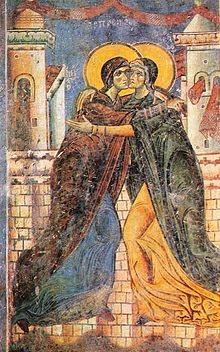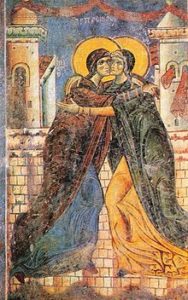Central idea: From his conception, John the Baptist is Christ’s divinely appointed herald. Doctrine: John the Baptist and the Holy Spirit. Practical application: Be led by the Holy Spirit by prudence and counsel.
Lectionary 587.
Reading 1 Is 49:1-6
Hear me, O coastlands,
listen, O distant peoples.
The LORD called me from birth,
from my mother’s womb he gave me my name.
He made of me a sharp-edged sword
and concealed me in the shadow of his arm.
He made me a polished arrow,
in his quiver he hid me.
You are my servant, he said to me,
Israel, through whom I show my glory.Though I thought I had toiled in vain,
and for nothing, uselessly, spent my strength,
yet my reward is with the LORD,
my recompense is with my God.
For now the LORD has spoken
who formed me as his servant from the womb,
that Jacob may be brought back to him
and Israel gathered to him;
and I am made glorious in the sight of the LORD,
and my God is now my strength!
It is too little, he says, for you to be my servant,
to raise up the tribes of Jacob,
and restore the survivors of Israel;
I will make you a light to the nations,
that my salvation may reach to the ends of the earth.
- Isaiah’s prophesy that God will send a savior of all mankind can be applied, remarkably, to both Our Lord and to his forerunner John the Baptist.
- Through the angel Gabriel and John’s father Zachariah, the Lord gave John his name before his conception. This name means “The Lord is gracious.”
- John was a weapon of God’s salvation (“a sharp-edged sword” and “a polished arrow”).
- John is both God’s servant and a revealer of the glory of God.
- John’s service to God appeared to be a failure. He was imprisoned and slain. But God rewarded him by giving him glory.
- His service was to return God’s people to him, not just the Chosen People, but people “to the ends of the earth.”
Responsorial Psalm Ps 139:1b-3, 13-14ab, 14c-15
R. I praise you, for I am wonderfully made.
O LORD, you have probed me, you know me:
you know when I sit and when I stand;
you understand my thoughts from afar.
My journeys and my rest you scrutinize,
with all my ways you are familiar.Truly you have formed my inmost being;
you knit me in my mother’s womb.
I give you thanks that I am fearfully, wonderfully made;
wonderful are your works.My soul also you knew full well;
nor was my frame unknown to you
When I was made in secret,
when I was fashioned in the depths of the earth.
- This psalm is true for all of us. God is our creator. We are amazing beings. God knows us inside and outside. We ought to be grateful to God and filled with wonder.
- This psalm applies in a special way to the Baptist because God chose him to be the forerunner of Christ.
- He was conceived due to the miracle which overcame sterility.
- He was filled with the Holy Spirit even in his mother’s womb (CCC 717).
Reading 2 Acts 13:22-26
In those days, Paul said:
“God raised up David as king;
of him God testified,
I have found David, son of Jesse, a man after my own heart;
he will carry out my every wish.
From this man’s descendants God, according to his promise,
has brought to Israel a savior, Jesus.
John heralded his coming by proclaiming a baptism of repentance
to all the people of Israel;
and as John was completing his course, he would say,
‘What do you suppose that I am? I am not he.
Behold, one is coming after me;
I am not worthy to unfasten the sandals of his feet.’“My brothers, sons of the family of Abraham,
and those others among you who are God-fearing,
to us this word of salvation has been sent.”
- Here, Paul addresses both Jews (“sons of the family of Abraham”) and Gentiles (“those others among you who are God-fearing”).
- John the Baptist was Christ’s humble herald.
- He proclaimed “a baptism of repentance.”
- Like David (and preeminently John’s own cousin Jesus), John was also “a man after my own heart; he will carry out my every wish.”
Gospel Lk 1:57-66, 80
When the time arrived for Elizabeth to have her child
she gave birth to a son.
Her neighbors and relatives heard
that the Lord had shown his great mercy toward her,
and they rejoiced with her.
When they came on the eighth day to circumcise the child,
they were going to call him Zechariah after his father,
but his mother said in reply,
“No. He will be called John.”
But they answered her,
“There is no one among your relatives who has this name.”
So they made signs, asking his father what he wished him to be called.
He asked for a tablet and wrote, “John is his name,”
and all were amazed.
Immediately his mouth was opened, his tongue freed,
and he spoke blessing God.
Then fear came upon all their neighbors,
and all these matters were discussed
throughout the hill country of Judea.
All who heard these things took them to heart, saying,
“What, then, will this child be?”
For surely the hand of the Lord was with him.
The child grew and became strong in spirit,
and he was in the desert until the day
of his manifestation to Israel.
- When Gabriel announced to Zechariah that his wife Elizabeth, assumed to be barren, would conceive a son in her old age, the angel said “you shall call his name John” (Lk 1:13).
- As the child grew, his neighbors in the hill country of Judea could see he was “strong in spirit.” Indeed, the spirit that was strong in him was the Holy Spirit which was operative in him from his conception.
Doctrine: John the Baptist and the Holy Spirit
- John the Baptist’s God-given mission was to prepare God’s people for their Savior, Jesus Christ.
- One reason we celebrate the Birth of John the Baptist liturgically is that “already from his mother’s womb [he] welcomes the coming of Christ” (CCC 523).
- “John was ‘filled with the Holy Spirit even from his mother’s womb’ [Lk 1:15, 41] by Christ himself, whom the Virgin Mary had just conceived by the Holy Spirit. Mary’s visitation to Elizabeth thus became a visit from God to his people” (Cf. Lk 1:68) (CCC 717).
- In other words, the unborn Christ gave the unborn John the gift of the Holy Spirit.
- By giving John the Holy Spirit, Christ made him one of the first people of God.
- By being physically carried within Mary’s womb, Christ visited John and his mother Elizabeth (who also “was filled with the Holy Spirit” (Lk 1:41)).
- In John, “the Holy Spirit concludes his speaking through the prophets. John completes the cycle of prophets begun by Elijah” (CCC 719). John is “More than a prophet” (Lk 7:26) because “the fire of the Spirit dwells in him and makes him the forerunner of the coming Lord” (CCC 718).
- John “proclaims the imminence of the consolation of Israel; he is the ‘voice’ of the Consoler who is coming” (CCC 719).
- The consoler is the Holy Spirit.
- John can be the voice of the consoler because of the Holy Spirit dwelling in him.
- “As the Spirit of truth will also do, John ‘came to bear witness to the light’” (CCC 719).
- The Spirit of truth is the Holy Spirit.
- “Finally, with John the Baptist, the Holy Spirit begins the restoration to man of ‘the divine likeness,’ prefiguring what he would achieve with and in Christ” (CCC 720).
- We commemorate the Birth of John the Baptist because the Holy Spirit filled this person in-utero at least from the time he met the in-utero Christ: “And when Elizabeth heard the greeting of Mary, the babe leaped in her womb; and Elizabeth was filled with the Holy Spirit” (Lk 1:41).
Practical application: Be led by the Holy Spirit by prudence and counsel.
- In Romans (8:14), St. Paul says, “For all who are led by the Spirit of God are sons of God.”
- God the Father will lead his human sons by his Holy Spirit.
- We are sons of God if we are baptized and in a state of grace.
- Therefore, if we are wise, we will want to walk in the spirit of God.
- In truth, what could be better than to be always inspired, counseled, and assisted by God himself in the person of the Holy Spirit?
- Now, turning to our 2000-year tradition of Catholic wisdom, we can consider the natural and supernatural virtues of prudence and the gift of the Holy Spirit of counsel.
- Prudence is the habit by which one determines what would be the best thing to do in any situation and then does it.
- Natural prudence is a human virtue by which we take counsel, make a decision, and then act.
- Supernatural prudence is even better because it is grace-assisted and its aim is to please God.
- Counsel is the best because it is the gift of the Holy Spirit. According to Fr. John Hardin’s Catholic Dictionary counsel is
- Prudence is the habit by which one determines what would be the best thing to do in any situation and then does it.
one of the special gifts of the Holy Spirit; it perfects the virtue of prudence. Its function is to enable a person to judge promptly and rightly, as by a sort of supernatural intuition, what should be done, especially in difficult situations. With the gift of counsel, the Holy Spirit speaks, as it were, to the heart and in an instant enlightens a person what to do. It corresponds to the promise made by Christ to his followers, “When they hand you over, do not worry about how to speak or what to say; what you are to say will be given to you when the time comes; because it is not you who will be speaking; the Spirit of your Father will be speaking in you” (Matthew 10:19).
Counsel refers primarily to prudent conduct in one’s own case, and only secondarily in favor of others. Enlightened by the Spirit, a person learns what to do in a specific case and what advice to give when consulted or command to make if he is in authority.
- How to live the virtue of supernatural prudence and how to discern the inspirations of the Holy Spirit in the gift of counsel are subjects too vast to explicate here. This writer can offer two words of advice: ask God’s help to practice the supernatural virtue of prudence and ask the Holy Spirit for the gift of counsel.
- Here is a traditional prayer to ask help:
Come Holy Spirit, fill the hearts of your faithful and kindle in them the fire of your love. Send forth your Spirit and they shall be created. And You shall renew the face of the earth.
O, God, who by the light of the Holy Spirit, did instruct the hearts of the faithful, grant that by the same Holy Spirit we may be truly wise and ever enjoy His consolations, Through Christ Our Lord, Amen.


Leave a Reply